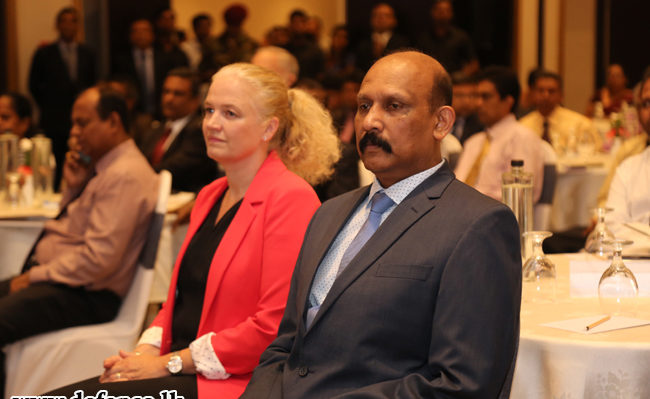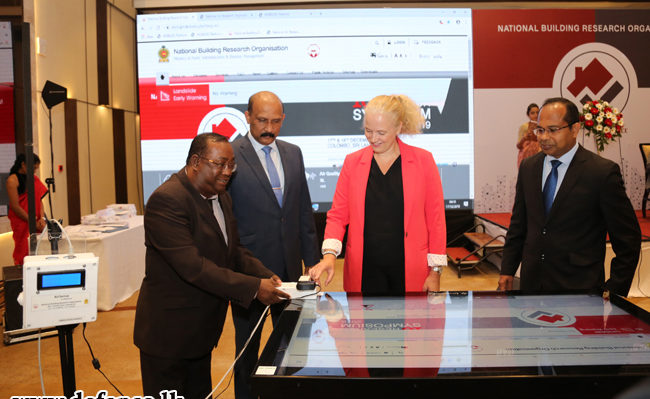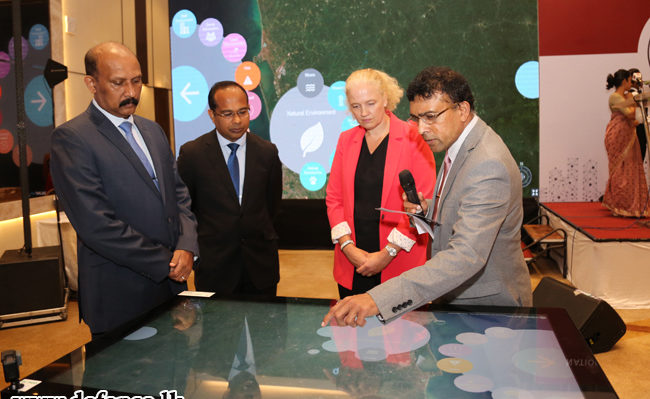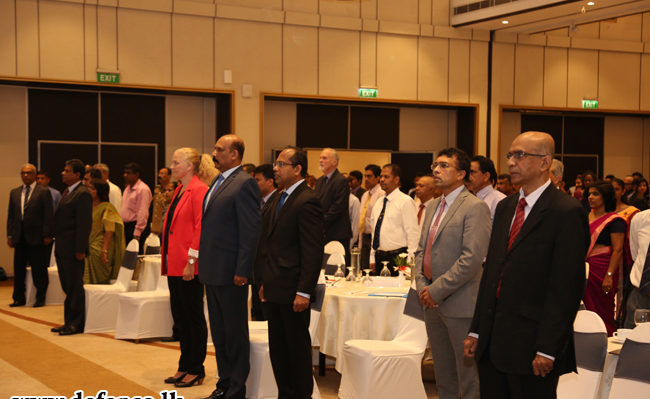The two-day symposium held in Sri Lanka, , it is aiming to showcase NBRO’s innovations –geotechnical guideline for safe construction of building foundations, technical guideline on building demolition work in Sri Lanka, handbook on test methods and specifications for material and product section and Air Quality Monitoring network under its Research and Development Program.

Norwegian Ambassador to Sri Lanka Trine Joranli Eskedal said the seven- year long cooperation between the Norwegian Geo-technical Institute and the NBRO, had facilitated to introduce the advanced Norwegian technology such as ground penetrating Radars, using drones to look for landslides, building warning systems and effectively conducting ground water continuation assessments among other.
“During the last few weeks we have heard that there have been several losses of lives and a considerable number of people were affected by the adverse weather conditions which led to floods and landslides in some parts of the island. In many cases it is possible to forecast natural disasters and early action is more effective than responding after the disaster has risen,” she said.

Ambassador Eskedal said there was a clear connection between the need to climate change reduction and prevention of climate related and other natural disasters and the need for humanitarian efforts.
She noted that it was the poorest communities that were at most risk from natural disasters, and in particular women and children.
“Experiences tell us that early warning systems based on landslide monitoring and predictions are most economical in landslide risk reductions because of prevention is significantly lower than the price of reparation,” Eskedal said adding that technology used in landslide identification can analyze, monitor, make predictions, reduce risks, and enhance sustainable disaster management.

She said this year’s theme for the symposium ‘Equitable Resilience’ was important and there was a need to make fundamental change for transformation when some stresses and shocks which were unavailable takes place.
“Governments, natural and social scientist , engineers , lawyers, and policy makers, businesses, NGOs, civil society and all of the individual have to work together to have a critical resilience and reach to sustainable forms to the global challenges in to this era,” Eskedal said adding that trans-disciplinary research cooperation are critical on this matter.
Sri Lankan Defence Secretary Maj.Gen. Kamal Gunaratne (Retd) emphasising the urgent need for a holistic precautionary approach for disaster management, said bringing disaster management stake holders within the purview of Defence Ministry would facilitate the coordination and cohesiveness at all levels.

He said disaster management was not a process that could be tackled in isolation but needed careful coordination, cooperation and liaison among many state holders to be successful in any emergency situation.
“Being cognizant of this vital need, President Gotabaya Rajapaksa has made the decision to synergize all these capabilities which were under different establishments, under the Ministry of Defence to achieve efficiency and effectiveness as a cohesive outfit to face any disaster situation in future,” he said.
Maj.Gen. Gunaratne said with this new move the government would be able to focus more towards enhancing resilience empowering the people, to take appropriate action during and post disaster phase.

Referring to the 10 policy decisions, including sustainable environmental management, development of natural resources and a society based on technology which are more directly linked to the disaster resilience, taken by President Rajapaksa, he said all stake holders were urgently required to line up to achieve the desired efforts of resilience.
Maj.Gen. Gunaratne, who was the chief guest at the 10th Annual Research Symposium of the National Building Research Organisation (NBRO) held in Colombo, today, said even though, the people were not immune to the destructive impact of the forces of nature, the impact could be reduced when communities were prepared to face natural calamities and their disruption.
He said two calamities – Meeriyabedda landslide in Badulla district and the Samasarakanda landslide in Kegalle district and its flow-on impact in last few years were reminding the need of well preparedness by local communities to get them immune from natural disasters.

“There is an urgent need for a precautionary approach with proper understanding of the risk and the need for cohesive approach which is capable of ensuring much more prescient, precise and holistic risk governance in the future,” he stressed.
Reminding the assistance extended by the Tri- Forces and the Police in disaster responses and providing relief to affected communities, he said troops were not only engaged in disaster management but also led the rehabilitation and reconstruction process.
According to Maj.Gen. Gunaratne, resilience to a disaster had been a prime concern in the past but in today’s context, vulnerability is not only associated with disaster, but also to environmental, social, health, economic and other related issues.
“Climate change makes extreme weather effects more likely than ever before. The average temperature of the globe has already risen by 1°C. Heat waves, droughts, floods, and violent storms could become much more common in the decades to come, making disaster risk reduction even more urgent priority,” he said.
Maj.Gen. Gunaratne said the building physical infrastructure, such as transport and energy systems and commercial and residential buildings, had not taken into account with associated disaster risks.
“The resilience-based sustainable development must be comprehensive in nature, and it requires integrated responses to complex challenges and respect for national ownership and leadership,” he said adding that NBRO has tremendously worked in disaster mitigation while introducing guidelines and provide guidance through its research and innovations.
Appreciating the contribution and support given by the international stakeholders during disaster situations, he said it was vital to work together in a more collaborative manner in managing disasters , which were challenging and required modern technology and innovation.
He also called for greater collaboration between the institutions, including the NBRO, working in the humanitarian and development fields to facilitate the communities affected by disasters to rebuild their lives to face future disasters.
(MOD LK)
